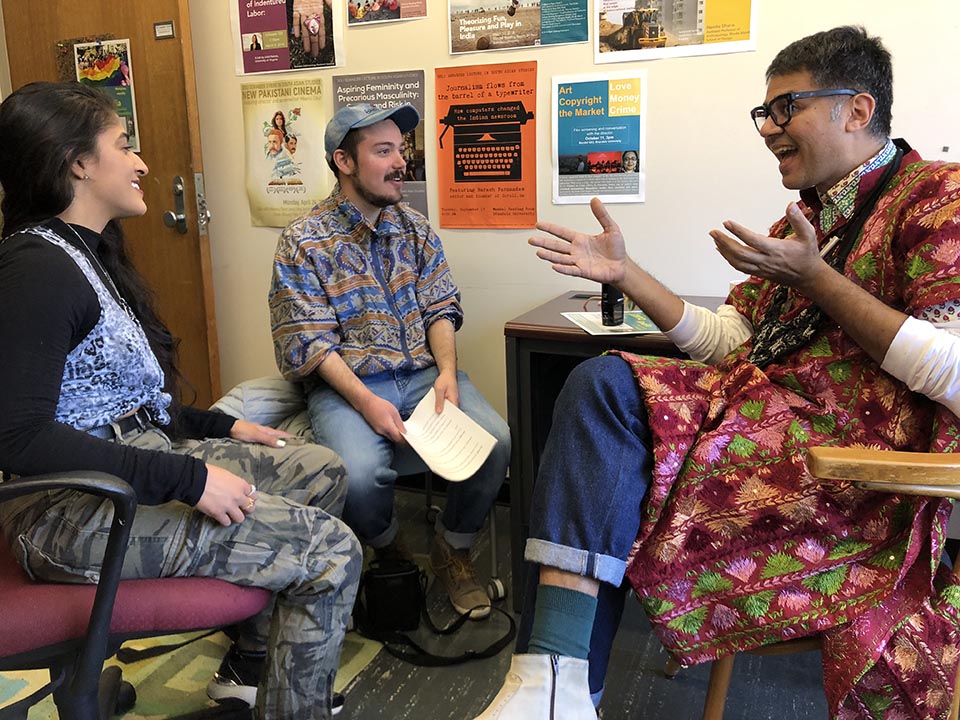Interview With Parmesh Shahani
Meet the 2018-19 Soli Sorabjee Lecturer in South Asian Studies, Parmesh Shahani
By Peter Diamond and Swati Kaushik

Parmesh Shahani is the director of the Godrej India Culture Lab, an experimental space that produces research and events spanning academia, activism, business, and the arts in Mumbai. He is also the author of "Bombay: Globalization, Love and (Be)longing in Contemporary India," a Yale World Fellow, and a TED Fellow, among numerous other accomplishments.
Who is Parmesh Shahani?A fashionista. An art collector. A performance artist. I help the world economy by consuming. I’m the reason why we don’t have a recession! But seriously, I work in what could be called applied humanities. I work in the corporate world, but I work on different issues of social change, whether it’s LGBT, culture, whatever. I think that sort of hybridity is interesting, so who is Parmesh? Parmesh is someone who is this hybrid kind of person who’s trying to live within the hyphen and flow between both ends.
In your book "Gay Bombay," you discuss using sexuality as a lens to assess other aspects of culture and politics to which sexuality is dominantly seen as excessive or external. Could you speak a little more about what this process has looked like for you?
[Gay Bombay] was a useful space to look at issues of identity, issues of community, issues of nationhood. There is still a certain idea of what it means to be a good Indian, and conforming to heteronormative imaginations is very important in that, so this book was also in a way saying that there are multiple ways of being Indian. Can queer people also articulate and lay claim to this? A lot of my respondents were really comfortable with their sexuality. It wasn’t their sexuality they were concerned about. It was, how do I frame or situate my sexuality in the context of my being a son, a brother, someone who’s expected to be married, someone who’s Gujarati or Sindhi or Parsi or Muslim or Brahmin? They saw it as an either/or, and I’ve always argued that it is an "and."
What is your favorite Indian love story?
My own! My partner and me met three years ago at Mumbai’s leading LGBT film festival. What’s interesting about this love story is that we are [from] very different backgrounds. His family is very conservative and super casteist, and they’re still looking to find a girl for him to marry. It’s an amazing love story because it shows the redemptive and transformative power of love. We’re so different, and the past three years have been this incredible discovery of our sharing of our worlds with each other, and showing that love can be a bridge that you can use to cross into different worlds. It’s very easy to tell everyone to come out when your own parents have accepted you, but if you’re in a situation where they might kill you or harm you, then it’s not so easy to think "maybe I should come out." He’s closeted. It’s his choice if he ever wants to come out. My love for him isn’t going to diminish or change whether he comes out or not. He’s going to resist in a way that he can, and in a way that he will choose, in a way that’s best for him and his family’s interest. It needn’t be oppositional.
What have you learned from being a part of LGBTQ movements in both the United States and in India?
I’ve learned to value multiplicity. There are multiple ways of being, and as long as we can recognize that and respect others for their ways of being, I think that’s fine. I don’t like binaries, center versus periphery. Why can’t we all be nodes in a fractal and interconnected network? At least in queer studies, to put all countries on this linear map, and to say, "America did this, and India is so many years behind, and so it will follow the same trajectory," is silly because we all have such different contexts and circumstances. The Indian queer movement has really learned a lot from queer movements all over the world, but in return, it has also given a lot to queer movements all over the world, so think of it like exchange rather than a one-way flow. I’m lucky that we have the Culture Lab as a very public space, where I can tease out some of these conversations over time, and if you see our programming over the years, you can see how it has become so much richer, deeper, interconnected, and more meaningful, so it’s been a very good learning journey.